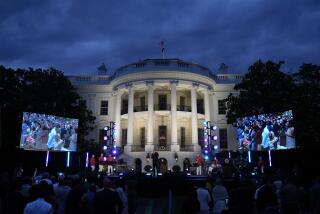Black Students at UCI King Forum Told Not to Forget Their Roots
- Share via
Black students at UC Irvine were warned Monday that getting caught up in the “emotional glamour” and incipient commerciality of the national Martin Luther King Jr. holiday would be a “disservice to the legacy” of the slain civil rights leader.
Na’im Akbar, professor of psychology at Florida State University in Tallahassee, opened UCI’s second annual Martin Luther King Jr. symposium by calling on the predominantly black audience of 200 to “respect the dignity of our heroes” and to use King’s life as “an inspiration for action.”
It would be a mistake, he said, to let the observance of next Monday’s government holiday turn into an excuse for having parties, sending greeting cards, wearing buttons and T-shirts or turning the day into an occasion wherein, like Christmas, “everything is for sale.”
The three-day symposium, which continues through Wednesday, the anniversary of King’s birth, includes a scheduled speech this evening by Martin Luther King III. Among those in the audience Monday were about 30 students from three Compton high schools with large minority enrollments who had toured the campus earlier in the day.
King, said Akbar, 41, “was an American hero,” not just a black hero, who saved a nation he found morally bankrupt before his assassination in 1968. Under President Reagan, he said, America has almost reached those depths once again, and “we need another King to save her.”
Charging that the President first opposed establishment of a federal holiday to mark King’s birthday and then embraced it when congressional passage became inevitable, Akbar said “that’s what actors do: they play whatever role they’re given.”
But much of Akbar’s speech was directed at what he said black students, faculty and staff should be doing for themselves at prestigious, predominanty white institutions like UCI.
“You need to remember what really got you here,” he said, referring to the barriers to higher education broken by the civil rights movement.
‘Don’t Forget Watts’
Believing that their educational success was solely the result of their own brilliance, he said, would be “the worst mistake you can make.”
Even in “the paradise of Irvine,” Akbar told the students, “you shouldn’t forget about Watts, where you came from.”
According to Paris Williams, head of the university’s Cross Cultural Center, there are about 300 black students at UCI and fewer than a dozen tenured black faculty.
Pressure forced white institutions to drop barriers to minority students, to set up special programs to help them matriculate and to set minimum goals for minority enrollment, he said. Without that kind of pressure, Akbar warned, the doors can one day close and “you’re gone.”
Before the civil rights movement, Akbar said, many black faculty and administration members “couldn’t have gotten in here with a crowbar and an army.”
After the speech, a student asked what she and others could do about the dearth of black studies courses offered in the UC system.
Akbar, noting his own experience at Florida State, said many black studies courses have been dropped because not enough black students sign up for them.
“They don’t believe it’s relevant to getting their degree,” he said. “The students who were responsible for putting pressure on the universities to bring in black faculty, bring in black administrators, don’t support them anymore. So if there are faculty people who will speak up on your behalf, to begin to identify things that are necessary to ensure your integrity, they get no support. They’re out there by themselves. So when they come up for tenure and people begin to see them as potential troublemakers, they ease them right out, and nobody says a word.”
Akbar said he was “suggesting the need for an Afro-centric paradigm, one which puts us and our reality in the center of the world and views the rest of the world from that perspective.”
He also criticized students for being preoccupied with social activities such as fraternities and sororities and with clothing, status, and pop music devoid of substance like, he said, that of Michael Jackson.
Black students who do have a social conscience must accept a kind of “double duty,” Akbar said. “You must do what’s necessary to get through this institution, while at the same time ‘pulling coattails.’ ”
Fellow students whose drive for success has separated them from their roots need to be roused, he said. “If they begin to say you’re a nuisance,” he said, “they start running when they see you coming, (so) make yourself a nuisance . It’s better to be a nuisance, trying to wake up sleeping people, than to later be condemned for having not told them what they needed to know.
“The time is coming, very soon, when those who didn’t know will be very angry with those who knew and didn’t tell them.”
More to Read
Sign up for Essential California
The most important California stories and recommendations in your inbox every morning.
You may occasionally receive promotional content from the Los Angeles Times.













